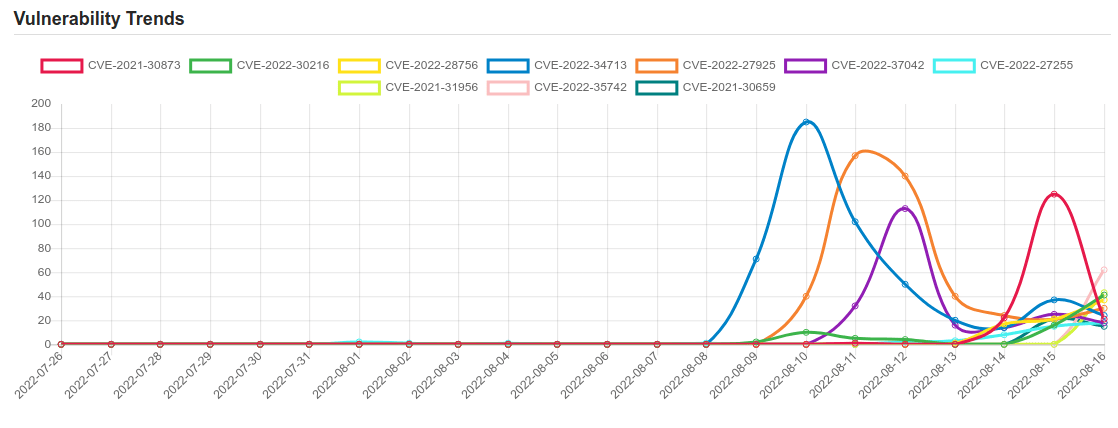Daily Vulnerability Trends: Wed Aug 17 2022

| CVE NAME | CVE Description |
| CVE-2022-35804 | SMB Client and Server Remote Code Execution Vulnerability. |
| CVE-2022-31793 | do_request in request.c in muhttpd before 1.1.7 allows remote attackers to read arbitrary files by constructing a URL with a single character before a desired path on the filesystem. This occurs because the code skips over the first character when serving files. Arris NVG443, NVG599, NVG589, and NVG510 devices and Arris-derived BGW210 and BGW320 devices are affected. |
| CVE-2022-26923 | Active Directory Domain Services Elevation of Privilege Vulnerability. |
| CVE-2021-40444 | Microsoft MSHTML Remote Code Execution Vulnerability |
| CVE-2021-0920 | In unix_scm_to_skb of af_unix.c, there is a possible use after free bug due to a race condition. This could lead to local escalation of privilege with System execution privileges needed. User interaction is not needed for exploitation.Product: AndroidVersions: Android kernelAndroid ID: A-196926917References: Upstream kernel |
| CVE-2022-27254 | The remote keyless system on Honda Civic 2018 vehicles sends the same RF signal for each door-open request, which allows for a replay attack, a related issue to CVE-2019-20626. |
| CVE-2022-2585 | No description provided |
| CVE-2022-0028 | A PAN-OS URL filtering policy misconfiguration could allow a network-based attacker to conduct reflected and amplified TCP denial-of-service (RDoS) attacks. The DoS attack would appear to originate from a Palo Alto Networks PA-Series (hardware), VM-Series (virtual) and CN-Series (container) firewall against an attacker-specified target. To be misused by an external attacker, the firewall configuration must have a URL filtering profile with one or more blocked categories assigned to a source zone that has an external facing interface. This configuration is not typical for URL filtering and, if set, is likely unintended by the administrator. If exploited, this issue would not impact the confidentiality, integrity, or availability of our products. However, the resulting denial-of-service (DoS) attack may help obfuscate the identity of the attacker and implicate the firewall as the source of the attack. We have taken prompt action to address this issue in our PAN-OS software. All software updates for this issue are expected to be released no later than the week of August 15, 2022. This issue does not impact Panorama M-Series or Panorama virtual appliances. This issue has been resolved for all Cloud NGFW and Prisma Access customers and no additional action is required from them. |
| CVE-2022-34711 | Windows Defender Credential Guard Elevation of Privilege Vulnerability. This CVE ID is unique from CVE-2022-34705, CVE-2022-35771. |
| CVE-2021-30873 | A logic issue was addressed with improved state management. This issue is fixed in macOS Monterey 12.0.1. A malicious application may be able to elevate privileges. |
| CVE-2022-30216 | Windows Server Service Tampering Vulnerability. |
| CVE-2022-34713 | Microsoft Windows Support Diagnostic Tool (MSDT) Remote Code Execution Vulnerability. This CVE ID is unique from CVE-2022-35743. |
| CVE-2022-27925 | Zimbra Collaboration (aka ZCS) 8.8.15 and 9.0 has mboximport functionality that receives a ZIP archive and extracts files from it. An authenticated user with administrator rights has the ability to upload arbitrary files to the system, leading to directory traversal. |
| CVE-2022-37042 | Zimbra Collaboration Suite (ZCS) 8.8.15 and 9.0 has mboximport functionality that receives a ZIP archive and extracts files from it. By bypassing authentication (i.e., not having an authtoken), an attacker can upload arbitrary files to the system, leading to directory traversal and remote code execution. NOTE: this issue exists because of an incomplete fix for CVE-2022-27925. |
| CVE-2022-27255 | In Realtek eCos RSDK 1.5.7p1 and MSDK 4.9.4p1, the SIP ALG function that rewrites SDP data has a stack-based buffer overflow. This allows an attacker to remotely execute code without authentication via a crafted SIP packet that contains malicious SDP data. |
| CVE-2021-31956 | Windows NTFS Elevation of Privilege Vulnerability |
| CVE-2022-35742 | No description provided |
| CVE-2021-30659 | A validation issue was addressed with improved logic. This issue is fixed in iOS 14.5 and iPadOS 14.5, watchOS 7.4, macOS Big Sur 11.3. A malicious application may be able to leak sensitive user information. |
| CVE-2021-1585 | A vulnerability in the Cisco Adaptive Security Device Manager (ASDM) Launcher could allow an unauthenticated, remote attacker to execute arbitrary code on a user’s operating system. This vulnerability is due to a lack of proper signature verification for specific code exchanged between the ASDM and the Launcher. An attacker could exploit this vulnerability by leveraging a man-in-the-middle position on the network to intercept the traffic between the Launcher and the ASDM and then inject arbitrary code. A successful exploit could allow the attacker to execute arbitrary code on the user’s operating system with the level of privileges assigned to the ASDM Launcher. A successful exploit may require the attacker to perform a social engineering attack to persuade the user to initiate communication from the Launcher to the ASDM. |
| CVE-2022-28756 | Zoom Client for Meetings for macOS privilege escalation | CVE-2022-28756 |
A considerable amount of time and effort goes into maintaining this website, creating backend automation and creating new features and content for you to make actionable intelligence decisions. Everyone that supports the site helps enable new functionality.
If you like the site, please support us on Patreon using the button below

To keep up to date follow us on the below channels.





![Cobalt Strike Beacon Detected - 45[.]143[.]233[.]205:80 7 Cobalt-Strike](https://www.redpacketsecurity.com/wp-content/uploads/2021/11/Cobalt-Strike-300x201.jpg)